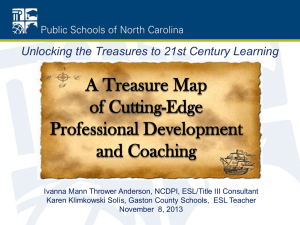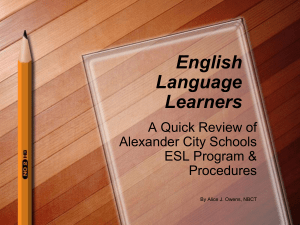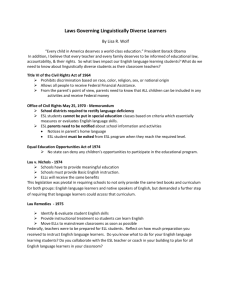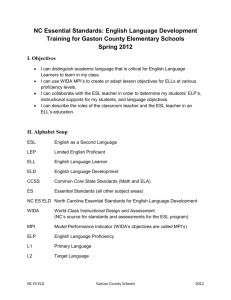Academic Language: The Can Do Philosophy NCDPI ESL /Title III Consultants
advertisement
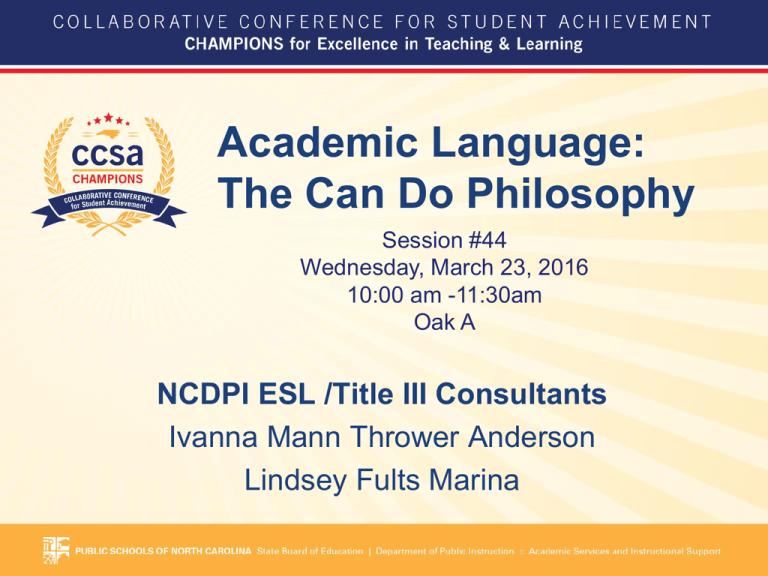
Academic Language: The Can Do Philosophy Session #44 Wednesday, March 23, 2016 10:00 am -11:30am Oak A NCDPI ESL /Title III Consultants Ivanna Mann Thrower Anderson Lindsey Fults Marina Our Vision To build capacity at the local school system level and sustain statewide implementation of research-based strategies to meet the needs of our English learners. English Learners in NC 120000 100000 80000 60000 LEP 40000 2014-2015 2012-13 2010-11 2008-09 2006-07 2004-05 0 2002-03 20000 Presentation Goals While exploring the North Carolina Can Do Approach we will: • identify challenges to meeting the academic language needs of ELs. • explore possible Can Do approaches to overcoming those challenges. • determine next steps. Identify Challenges Take 1 Limited • Time • Personnel • Funds Take 2 Limited • Personnel • Funds Your Turn: Use the first column on the chart to identify 2 or 3 global challenges you face when working to meet the needs of ELs within your environment. Take 2 minutes. Can Do Approaches: Personnel and Funding • • • • • Use On-Line and Virtual Tools Build Capacity Develop Resources Build Internal Partnerships Build External Partnership Use of On-Line Site Personnel and Funds • Keep site current • House PD Materials • Provide MPIs for English Language Arts • Provide EL Coordinator Resources • Provide Charter Resources On-line modules Personnel and Funds Current: WIDA http://eldnces.ncdpi.wikispaces.net/NC+WIDA+Module s LinguaFolio http://www.learnnc.org/lp/editions/linguafolio/ In Process: • Develop PLC Guides for modules. • Pilot in Spring 2016. • Release for 2016-17. Coming Soon: • Develop new modules such as Co-teaching, Working with SIFE, etc. • New platforms may make this even easier. Virtual Opportunities • • • • Combined – some f2f others virtual Training: initial and follow up Coaching Work sessions – create materials • Synchronous • Asynchronous • Webinars and Archives • MOOCs Build capacity • • • • • • • • Regionally Based Professional Development WIDA Professional Development EL Support Team Annual EL Support Conference Understanding Language EL Coordinator Meetings Carolina TESOL involvement Resource Development Digital Integration This workshop focuses on how to utilize digital tools to increase access to content learning for ELs. WIDA Workshops EL Support Team Per [Sec. 3115 (c)(2)] of the No Child Left Behind Act of 2001,training provided through the ELL Support Team must be part of a larger PD Plan which will be documented via an ELL Implementation Plan that is submitted to the state for approval. The NCDPI EL Support Team is a cadre of teachers, administrators and retirees with a strong understanding of theory-based concepts for best-practices in EL student education offering training and coaching opportunities across the state. 2nd Annual EL Support Conference #NCELL15 Understanding Language 2014-2015 • English Language Arts • Mathematics 2015-2016 • English Language Arts • More information forthcoming Develop Resources Shared Training Materials • On-line Modules • SIOP • Elementary • PLC Guides for on-line • Secondary modules • Advanced • On-line Site • ExC-ELL • Yet to come • Elementary • • • • Secondary Best practices for ELs WIDA Digital Integration • Early education • SIFE • Co-Teaching Build Internal Partnerships Personnel and Funds • Curriculum and Instruction • • – English Language Arts • – Math • – Students with Disabilities • Title I • Accountability • Dual Language Immersion World Languages Early Learning K-3 Literacy Data Management Group • Charters • RtI/MTSS Build External Partnerships Personnel and Funds • National Council of State Title III Directors • CCSSO EL SCASS • TESOL • Regional Education Service Alliance (in NC) • Comprehensive Center (In South East US) • Institutes of Higher Education • Governors Advisory Council on Hispanic/ Latino Affairs • Other SEAs Your Turn Your Turn: Use the second column on the chart to explore possible Can Do approaches to overcoming those challenges. If possible next steps come naturally, go ahead and enter them in the 3rd column or work on those after the presentation. • You may work alone or with a partner or partners for 1 minute We will share out ideas afterwards The NC Can Do Philosophy is built upon our vision to build capacity at the local school system level and sustain statewide implementation of research-based strategies to meet the needs of our English learners. Goals While exploring the North Carolina Can Do Approach we will: • identify challenges to meeting the academic language needs of ELs. • explore possible Can Do approaches to overcoming those challenges. • determine next steps. The Vision for ESL from NCDPI: To build capacity at the local school system level and sustain statewide implementation of research-based strategies to meet the needs of our English learners. Take 1: Identify Challenges to meeting the academic language needs of ELs in NC: Limited Time, Limited Personnel, Limited Funds Take 2: Combine Time and Personnel Identify Challenges Brainstorm Possible Can Do Approaches Determine next steps limited ESL personnel 3 state level consultants 115 LEAs Over 100 charters 1. 2. 3. 4. 5. limited funds 1. 2. Use of on-line site as first point of contact Develop and/or better utilize on-line modules Build capacity through EL Support Team, WIDA training of Trainers, and other WIDA trainers, annual ELL Support Conference, build internal partnerships (RtI/MTSS, Content sections, accountability, DLI, World Languages, charters) build external partnerships for research, advising etc (RESA, IHEs) Use of technology to reduce travel: a. Virtual Opportunities b. On-line site development (MPIs for ELA, Charter page, LEP Coordinator page) c. Module development (WIDA, LinguaFolio, Co-Teaching) d. Resource development (Training materials shared, PLC Guides for on-line modules) e. Going Green f. MOOC participation (Constructive Conversations, Understanding Language) Develop Partnerships a. IHEs assist in preparation for ESL licensure b. IHE helps prepare pre-service teachers to work with ELs c. Regional Comprehensive center secures assistance from other outside resources d. Internal: MTSS/DLI etc. share message 1. 2. Keep up to date with PD materials, info, etc. Develop PLC Guides for modules. Pilot in January. Release for 2015-16. Develop new modules such as Co-teaching, Working with SIFE, etc. New platform (Canvas) may make this even easier. 3. Continue as part of long term PD plan. 4. Strengthen work with MTSS by developing ESL FAQ, Support DLI Leadership training, training development for LF, continue charter presentations. 5. Continue work with IHEs on research on effective programs, course work collaboration, new grants for teacher prep, etc. and determine next steps. Participate in Year 4 with SECC evaluation of Support Team, LF translations, etc. Research what other states are doing about x, assist in evaluation of team, etc 1. a. Determine which opportunities can successfully be virtual. Archive and post for future use. b. See #1 above. c. See #2 above d. Best practices just developed. How to use? PLC guides in progress. Early education, SIF co-Teaching on annual development plan. e. Continue to go green for meetings. Utilize technology. Determine what needs to be printed and how it will be used. f. Continue to use free MOOCs and work in teams across the state – ie Constructive Conversations, Understanding Language. 2. See #4 and 5 above CCSA March 23, 2016 NCDPI ESL/Title III Consultants: Ivanna M T Anderson Ivanna.anderson@dpi.nc.gov and Lindsey Fults Marina lindsey.fults@dpi.nc.gov The Vision for ESL from NCDPI: To build capacity at the local school system level and sustain statewide implementation of research-based strategies to meet the needs of our English learners. Your Turn: Identify Challenges Brainstorm Possible Can Do Approaches Determine next steps CCSA March 23, 2016 NCDPI ESL/Title III Consultants: Ivanna M T Anderson Ivanna.anderson@dpi.nc.gov and Lindsey Fults Marina lindsey.fults@dpi.nc.gov
